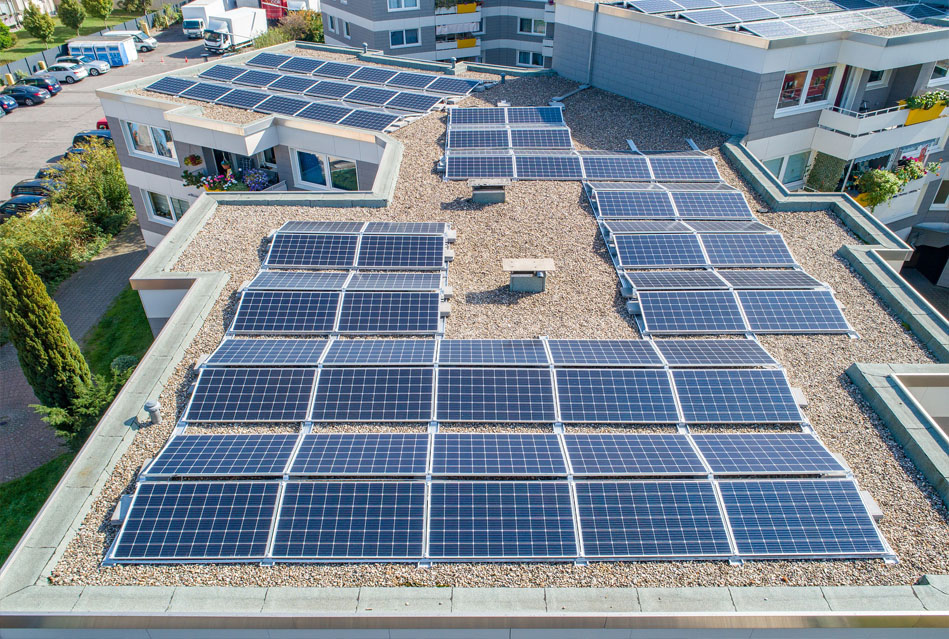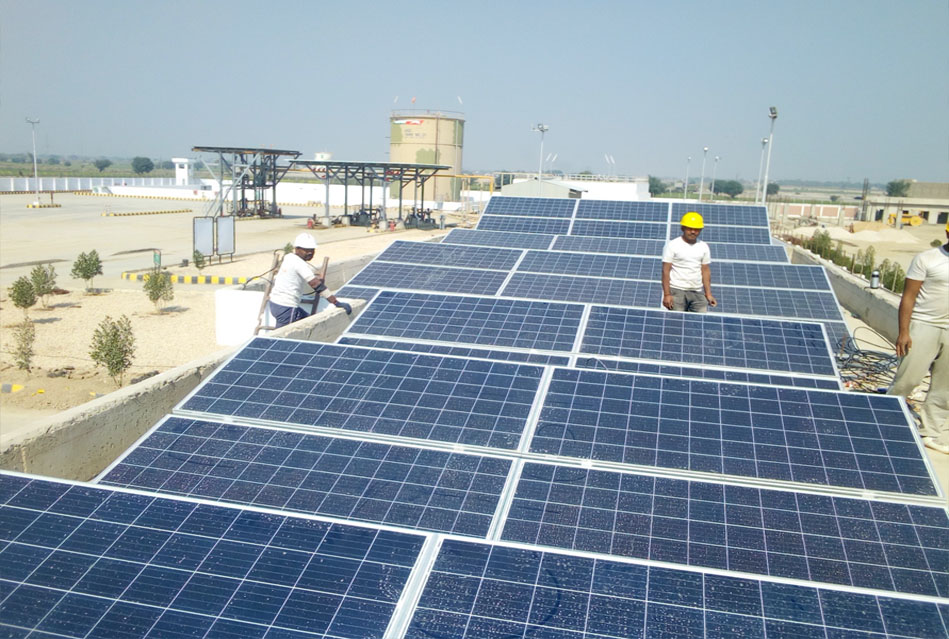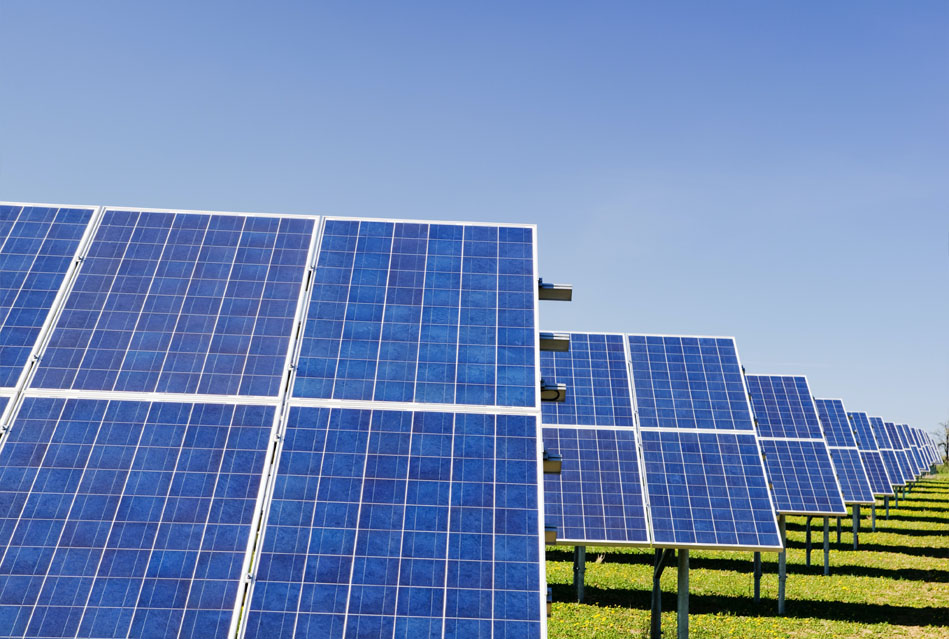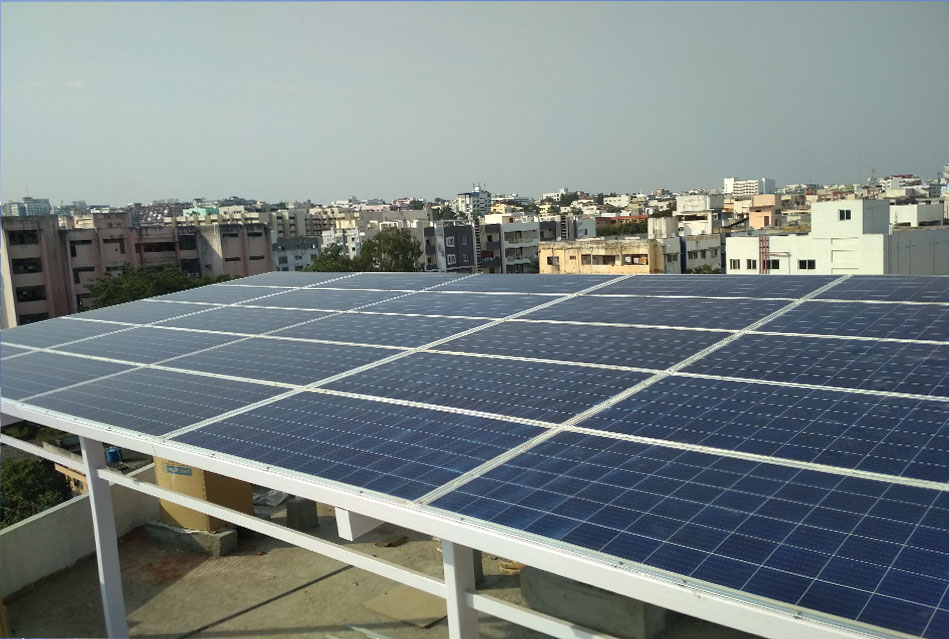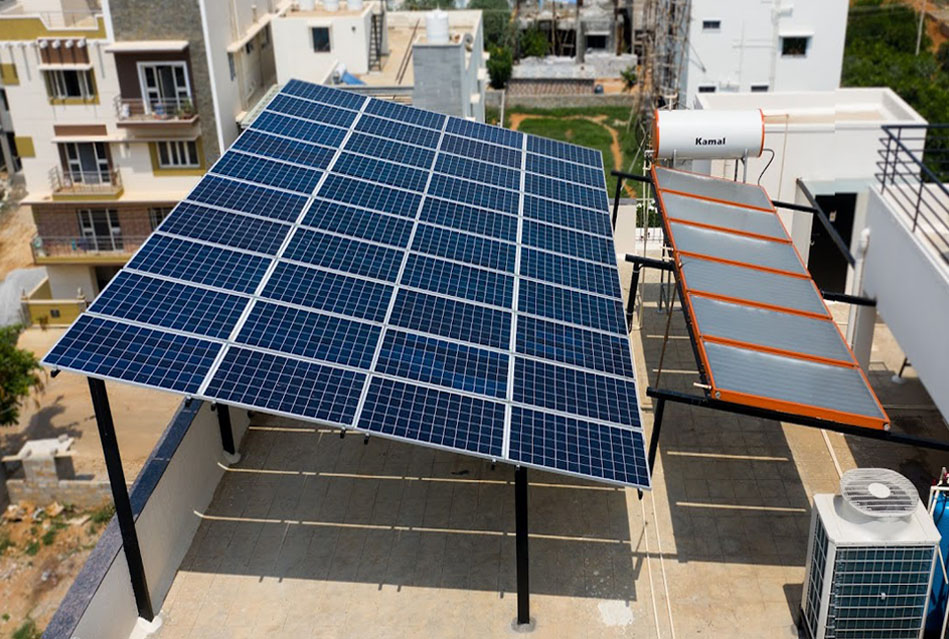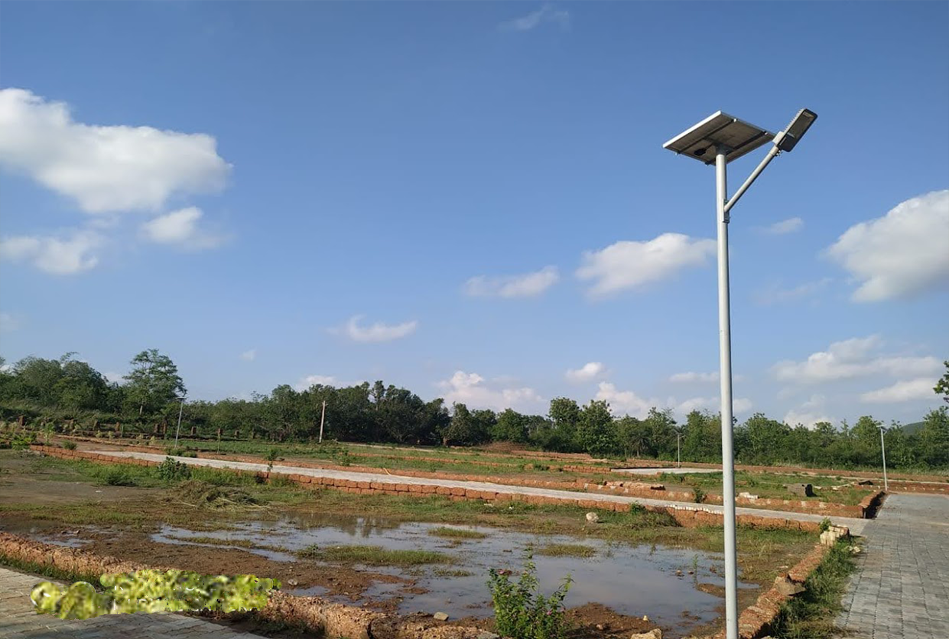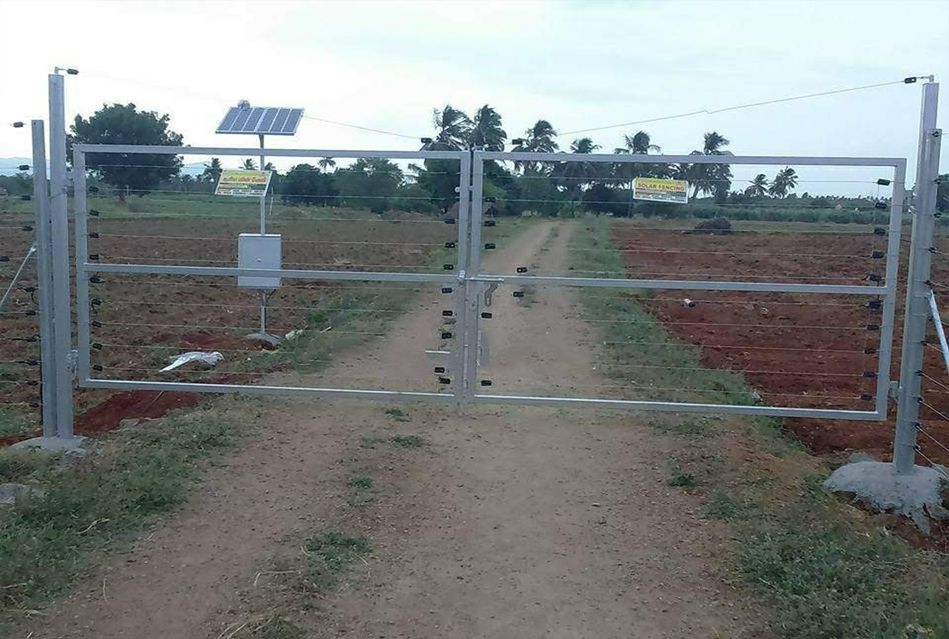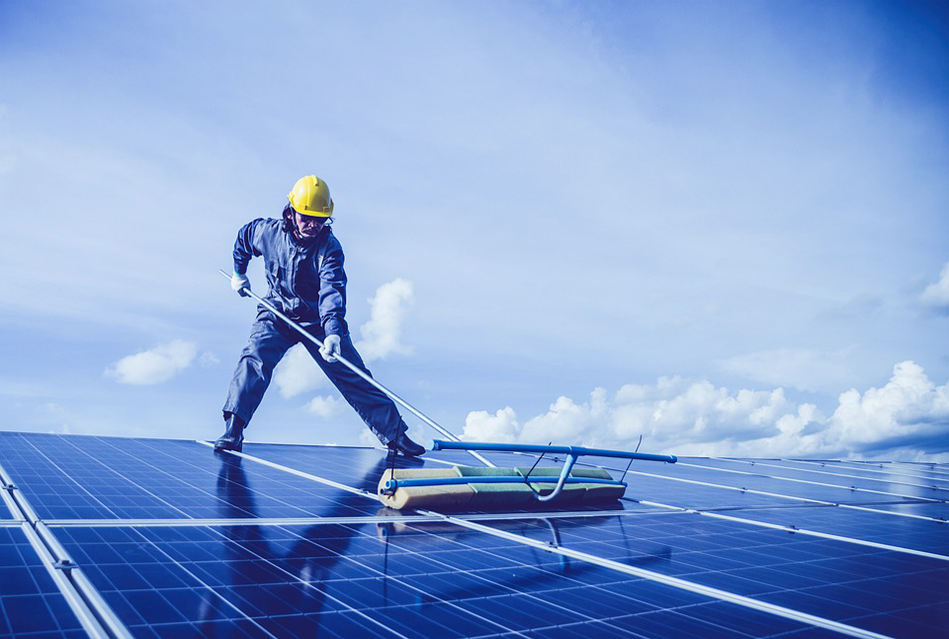Residential Solar System for House
Rising electricity bills in summer is the biggest concern for every household in India, and to address this is Solar Panels for house. Many households in India are going for solar to have 24×7 power and to save on electricity bills. Depending on the electrical load that one wish to run on solar and the budget, you can choose either On-Grid or Off-Grid Solar System.
- Low maintenance cost
- Suitable for Indian climate
- Increases access to energy
- Green source of energy
Industrial Solar System
India is a developing country, and Industries are growing rapidly. One thing which is of concern is the huge electricity bills the industries pay. With the provision of open access in most of the states, industrial solar power systems are increasingly used by various sectors such as textile, cement, paper, steel, chemical, dairy and ceramic industries to cut down their electricity expenses.
- Reduced Electricity Bills
- Increase in your property value
- Consume free power
- Low Maintenance and High Reliability
- Financial Stability and Cost Control
On-Grid Solar System.
On-grid solar power system is a solar power generation system where it is connected to the utility grid. The electricity produced by the system is routed to the grid from where it is used to run the various appliances. The installation of the same is also fuss-free and easy to maintain.
- Zero Electricity Bills
- Easy maintenance
- You get to use 100% renewable energy
- Very reliable
Off-Grid Solar System.
An off-grid solar system (off-the-grid, standalone) is the obvious alternative to one that is grid-tied. To ensure access to electricity at all times, off-grid solar systems require battery storage and a backup generator (if you live off-the-grid). On top of this, a battery bank typically needs to be replaced after 10 years.
- Avoid Power Outages
- Reduced electricity costs
- Easier Installation
- Keeping the Environment Clean and Green
Solar Roof-top Solution.
Increase In demand of electricity is rising cost of electricity and results to increase in electricity bill. This makes today the best time to invest in solar rooftop systems. If you switch to KW Solar Rooftop for Home, you can immensely save up on your electricity bills. You will see it go down by up-to 50%. Government is also encouraging residential as well as commercial installation of rooftop solar power plant.
Types of Solar Roof-top Solutions:
Residential – Solar rooftop for home installation is affordable for almost anyone to get started on a Greener, Cleaner and Cheaper way forward. Installing a solar power KW system will instantly add to the value of your residential property.
Commercial & Industrial – Solar rooftop systems will provide a good return on investment by utilizing idle roof space. we provide customized solution for your solar solution need and help to implement sustainable solar power solutions for your commercial and industrial establishment.
Institutional – Solar rooftop systems for institutions such as schools, colleges, universities, Research organizations, Non-profit organizations helps to meet their energy needs.
Solar Water Pump System
Solar water pumps are powered by solar panels. Once you have the panel, all the energy you need comes from the sun and is completely free!
This is a major advantage over fossil fuel pumps which require you to constantly buy fuel. Fuel can add a significant cost to your farm irrigation.
Using free solar energy is also an advantage over manual irrigation which takes up a lot of your valuable energy and time.
Advantages of Solar water pump:
- No fuel cost – as it uses available free sun light.
- No electricity required.
- Long operating life.
- Highly reliable and durable.
- Easy to operate and maintain.
- Eco-friendly.
Disadvantages of Solar water pump:
- Capital costs typically higher than equivalent diesel solutions.
- Most of application need water storage typically larger than for equivalent diesel systems.
- Risk of theft of panels, that are still seen as a valuable commodity in some locations.
- System is dependent on solar radiation levels.
Solar Water Heater Solutions.
Solar water heating system is a device that helps in heating water by using the energy from the SUN. This energy is totally free. Solar energy (sun rays) is used for heating water. Water is easily heated to a temperature of 60-80 Celsius. Solar water heaters (SWHs) of 100-300 liters capacity are suited for domestic use. Larger systems can be used in restaurants, canteens, guest houses, hotels, hospitals etc. A 100 liters capacity SWH can replace an electric geyser for residential use and may save approximately 1500 units of electricity annually. The use of 1000 SWHs of 100 liters capacity each can contribute to a peak load saving of approximately 1 MW. A SWH of 100 liters capacity can prevent emission of 1.5 tones of carbon dioxide per year.
Types Of Solar Water Heater
Basically two types of solar water heater are available in the market.
-
Flat Plate solar water heater – Solar radiation is absorbed by flat plate collectors which consist of an insulated outer metallic box covered on the top with glass sheet.
-
Evacuated Tube Collector – The Collector is made of double layer borosilicate glass tubes evacuated for providing insulation.
Solar Street Light System
Solar street lighting system uses the photovoltaic technology to convert the sunlight into DC electricity through solar cells. The generated electricity can either be used directly during the day or may be stored in the batteries for use during night hours.
They are water-resistance and weatherproof and have a low glare and low insect attrition rate. The solar panels in these lights convert solar energy into electrical energy that gets stored in the inbuilt battery and is utilized for dusk-to-dawn lighting operations.
Advantages of Solar Street Light System:
- Solar street lights are independent of the utility grid.
- Solar street lights require much less maintenance compared to conventional street lights.
- Since external wires are eliminated, risk of accidents are minimized.
- Electricity produced from solar panels is non-pollutive.
Disadvantages of Solar Street Light System:
- Initial investment is higher compared to conventional street lights.
Solar Power Fencing System
A solar fence works like an electric fence which delivers a brief yet fierce shock when human beings or animals come in contact with the fence. The shock enables a deterrent effect while ensuring that no loss of life is caused.
It consists of a Solar Photo Voltaic Module, Energizer, Fence Voltage Alarm (FVA), Battery and Charge Control Unit (CCU).
Advantages of Solar Power Fencing:
- Low maintenance cost.
- Highly reliable as it functions irrespective of grid failure.
- No physical harm caused to human beings or animals.
- Cost-effective.
- Makes use of renewable solar energy.
- Generally, comes with a centralized alarm system.
- Conformity with national and international safety standards.
Disadvantages of Solar Power Fencing:
- It is Vulnerable to Power Outages and may lead to loss of life and assets when the supply ceases to exist
- Electric fences can pose a real danger for small children and pets, and so it is advisable to analyze the situation before deciding to install one.
Operation and Maintenance (O&M)
Operation & Maintenance (O&M) is one of the most critical ways to ensure that the solar power system gives the best possible generation. At Rahmat Solar Solutions, we work to maintain the plant infrastructure and equipment, with the goal of improving the equipment’s life by preventing excess depreciation and impairment. This enables the plant to produce the maximum amount of energy throughout its operational life, perfectly aligning the interests of developers, clients and the investors.
Combining our experience in plant maintenance and advanced diagnostics with our expert O&M staff using remote monitoring system, Rahmat Solar Solutions ensures the plant functions smoothly, thereby continuously generating solar power.
Solar Panels Maintenance :
- Junction Box Replacement
- Diode Replacement
- Mosfet Replacement
